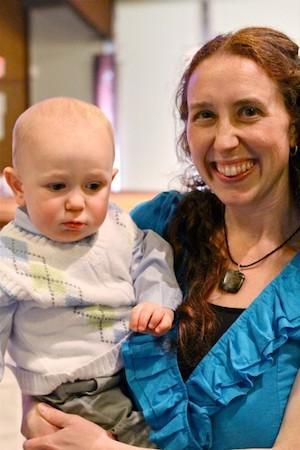Westmont Magazine Making Music a Major Part of Life
Sarah George Majorins ’01 has been making music all her life, playing the piano at 4 and composing at 6. The daughter of a pastor, she grew up immersed in church music. She came to Westmont to study composition with Steve Butler and prepare for a musical career. Singing in three college choirs and taking piano and voice lessons broadened her experience.
The music faculty inspired Sarah to attend graduate school, and she enrolled at UC Davis right away. In six years, she completed a master’s degree and a doctorate in theory and composition.
Sarah has successfully composed a musical life for herself. She and her husband, Philip, share a position as worship arts director at Christ Church in Davis, Calif. A mutual friend, who knew that both Sarah and Phillip love music, playfully introduced them. Phillip’s a music critic who writes for two websites. Sarah teaches piano lessons and composes and arranges music for churches, weddings and events, drawing clients from a national network of church musicians. The pregnant mother of three small children (4, 2 and 1), she appreciates the ability to compose, arrange and teach at home.
“I always expected to do a smattering of things as a musician,” she says. “I’ve taught part time at UC Davis and a community college, and I’d like to teach again. But I really enjoy my church work. I served as the music director at Christ Presbyterian Church in Santa Barbara while I attended Westmont and at a Presbyterian church in Roseville during graduate school.”
At Christ Church, a newly planted Christian Reform congregation, Sarah and Phillip write music for services and hire instrumentalists and singers to perform it.“We host sessions in our home for local amateur musicians and teach them the music we’ll play on Sunday,” Sarah says.“It’s a great way to get people from the community involved in our church.”
Sarah belongs to an online network of church musicians who seek to reclaim a sense of liturgical music in their congregations. Music directors from churches throughout the country, many Presbyterian or Christian Reform, hire her to compose or arrange pieces to suit their specific needs and ensembles. On Sarah’s website (glorianotes.com), prospective clients can hear her arrangements and scores and read her occasional blogs about new compositions or musical experiments at Christ Church.
“Too much contemporary Christian music just mimics the rock culture,” Sarah says.“The type of music you play in church matters. Music is not abstract; you can’t just put your own meaning on it. We focus on singable music, such as folk tunes and early American pieces.We want to attract people my age and younger to liturgical music, make it fresh and give it a new sound.”
Sarah’s work extends beyond the church. She wrote the string parts for an album of pop Christmas music and composed a fanfare for brass and percussion for a cousin’s wedding. She has contributed to several albums and received other commissions for wedding music.
Westmont’s faculty and broad musical curriculum helped equip Sarah for her career. “UC Davis did nothing to prepare me to teach,” she says.“My Westmont professors modeled great teaching, which helped me learn fast when I was shoved in front of a class on my first day of graduate school. I’ve got good memories of Westmont—it was a great jumping off place for me.”
